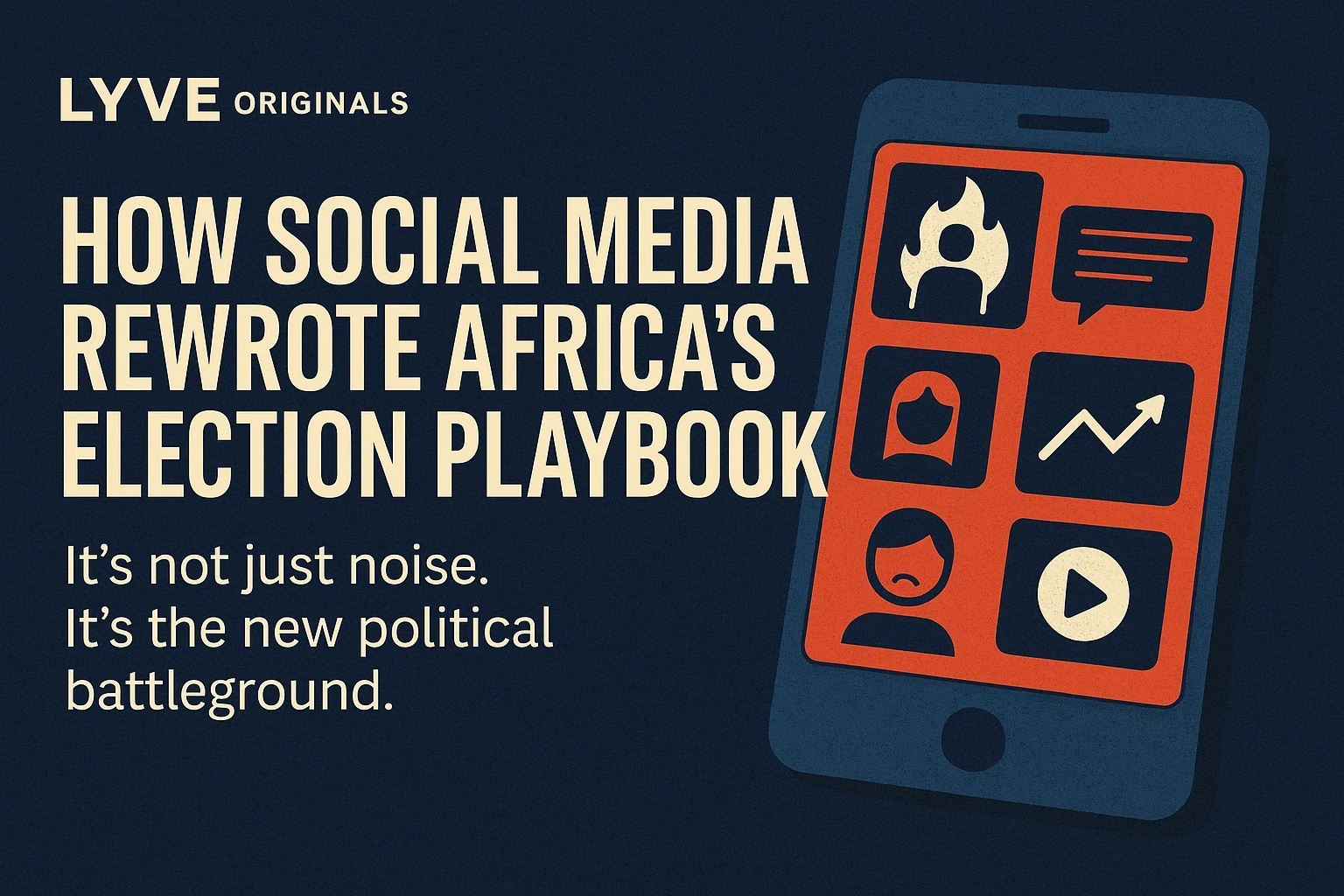How Social Media Rewrote Africa’s Election Playbook
It’s not just noise. It’s the new political battleground.
This is LYVE Originals — where Africa’s future gets a voice.
P.S. If you’re reading this, you’re already in the small circle that wants the full picture. That’s exactly why we built LYVE+ — deeper explainers, sharper analysis, and tools you can actually use. Keep scrolling. You’ll see why it matters.
Campaigns, Clout, and Chaos: Your Phone Is the New Polling Unit
Think back to the last election you followed. I still remember Ghana’s 2020 cycle — my first “update” didn’t come from the evening news.
It hit my phone before I’d even had my first coffee.
🔥 A candidate’s slick video jammed between a Black Stars meme and a dance challenge.
🗣️ A “leaked” voice note moving like harmattan fire through WhatsApp groups.
📈 A hashtag trending before lunch, pulling in first-time voters.
🎥 A chopped clip twisting a policy speech into tribal provocation.
😒 And that one cousin posting: “Voting won’t fix anything here.”
Elections don’t just happen in rally grounds anymore. They happen in your scroll… your shares… your DMs.
It’s not just chatter. It’s a political war room in your pocket.
Media Has Moved Headquarters
Billboards fade in the sun. Town halls draw half the crowd they used to. But online? The arena is packed — all day, every day.
From Lagos to Nairobi, Accra to Johannesburg, young voters live in the feed. A 30-second TikTok often feels more real than a two-hour rally speech.
🇰🇪 In Kenya’s 2023 race, campaigns hired meme-makers as actual staff.
🇬🇭 Ghanaian influencers became full-on party surrogates.
🇳🇬 #EndSARS didn’t just take on police brutality — it rewired a generation’s political instincts.
Social media isn’t a campaign accessory anymore. It’s the main stage.
Algorithms: Your Personal Political Bubble
Same election. Same week. Two completely different worlds.
👤 Voter A’s feed: corruption scandals, outrage hashtags, “everything’s broken.”
👤 Voter B’s feed: reform wins, hopeful rallies, “change is coming.”
Neither side is lying. But algorithms feed you more of what you already believe… until the “country” you think you’re in is custom-built for you.
Fake News: Cheap, Fast, and Deadly
You’ve seen it — I’ve seen it too:
⚠️ A grainy video with a mistranslated caption, stirring ethnic tension.
⚠️ An audio leak dropping 48 hours before polls.
⚠️ Posters you’ve never seen in real life but suddenly “everywhere” online.
Some of it’s sloppy accident. Much of it is surgical disinformation — spun by local operatives or overseas troll farms. And sometimes the aim isn’t to persuade you… it’s to wear you down.
- Confuse you until you give up.
- Keep you home on election day.
- Make you doubt the whole system.
Microtargeting: Politics Built Just for You
Ever had an ad that felt like it was written for your exact life?
🗣️ In Lagos, Gen Z voters got glossy “future jobs” videos.
🌾 Rural elders were promised farm subsidies and verses from scripture.
✈️ Diaspora audiences were sold cheaper remittances and visa reforms.
Same politician, multiple masks.
It’s clever — until it’s manipulative. Like giving ten speeches in ten rooms, hoping no one compares notes.
WhatsApp: The Shadow Campaign
When mobile data is expensive or the state starts censoring, campaigns duck underground. WhatsApp, Signal, Telegram — that’s where the real work happens.
Why?
🔐 Encryption makes it hard to trace.
🤝 It’s personal — “If my uncle sent it, it must be true.”
🚀 Dirt cheap — one image or PDF hits hundreds of chats in minutes.
These platforms protect activists… but also shelter disinformation networks. Some of the nastiest election meme wars you’ll never see on public feeds? They happened entirely inside closed groups.
When Trust Breaks, Democracy Bleeds
When citizens lose faith in elections:
❌ Turnout drops.
❌ Corruption festers.
❌ Accountability fades.
Trust is kola nut fragile — once cracked, the pieces don’t fit the same. And social media? It pressure-tests trust every single day.
Can the Same Tech Save Us?
It can — if we let it. The same channels tearing trust apart can stitch it back together.
✅ ReclaimNaija in Nigeria mapped polling stations and flagged issues in real time.
✅ Ushahidi in Kenya turned ordinary citizens into election monitors.
✅ Blockchain pilots are making vote tallies tamper-resistant.
In Nigeria’s 2023 polls, volunteers uploaded photos of tally sheets before they could be “adjusted.” Some rigging attempts didn’t even get the chance to breathe.
LYVE+ members don’t just hear about these wins — they see the play-by-play. Exclusive briefings, early trend alerts, and the deep research behind the headlines. It’s the difference between knowing and being prepared.
Africa’s Digital Democracy Crossroads
Social media is chaotic. Dangerous. Powerful.
✨ In Kampala, one teacher’s TikTok rant about school fees sparked national debate.
✨ In Accra, a hashtag storm forced a policy U-turn in weeks.
✨ In the diaspora, crowdfunding fuelled campaigns back home in real time.
The challenge isn’t the energy. It’s the channeling. That means:
- Teaching digital literacy across every age bracket.
- Regulating political ad transparency.
- Funding local fact-checkers like Dubawa and Africa Check.
- Holding platforms accountable for election chaos.
- Giving civic groups both legal cover and digital tools.
Your vote may be cast in a booth.
But it’s shaped — every day — in your feed.
This is LYVE Originals — where Africa’s future gets a voice.
If you believe democracy deserves more than soundbites and spin, step inside.
Join LYVE+ today — and get explainers, investigations, and tools built for Africa’s decision-makers and change-makers.
🔑 Become a Member — Own the feed before it owns you.
Get More Tech Insights
Subscribe to our weekly newsletter for the latest in African technology innovation.
